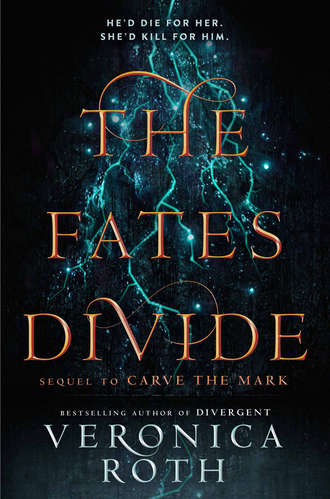
Полная версия
The Fates Divide
Its clear glass panels reflect the currentstream where it burns pink, and emptiness where it doesn’t. Little red lights along the ship’s borders blink on and off like inhales and exhales. Its movements around the sun are so slight it looks still.
“It’s different in images,” I say. “Much less impressive.”
“I spent three seasons here as a child.” Isae’s knuckles skim the glass. “Learning how to be proper. I had that brim accent—they didn’t like that.”
I smile. “You still do, sometimes, when you forget to care. I like it.”
“You like it because the brim accent is so much like your Hessan one.” She pokes her fingertip into my dimple, and I smack it away.
“Come on,” she says. “Time to dock.”
The ship’s captain, a squat little man with sweat dotting his forehead, noses his little ship toward the massive Assembly one—to secure entrance B, I’d heard him say. The letter was painted above the doors, reflective. Two metal panels pull apart under the B, and an enclosed walkway reaches for our ship’s hatch. Hatch and walkway lock together with a hiss. Another crew member seals the connection with the pull of a lever.
We all stand by the hatch doors as they open, making way for Isae to stand at the fore. It’s a skeleton patrol crew that picked us up, meant to cruise around the middle band of the solar system in case someone’s in trouble—or making it. There’s just a captain, a first officer, and two others on board with us, and they don’t talk much. Likely because their Othyrian isn’t strong—they sound like Trellans to me when they do speak.
I skip ahead into the bright tunnel beyond the hatch doors to catch up to Isae. The glass walls are so clean. I feel like I’m floating in nothingness for a tick, but the floor holds firm.
I just make it to Isae’s side when a group of official-looking people in pale gray uniforms greets us. At their sides are nonlethal channeling rods, designed to stun, not kill. The sight is reassuring. This is how things should be—controlled but not dangerous.
The one in front, with a row of medals on his chest, bows to Isae.
“Hello, Chancellor,” he says in crisp Othyrian. “I am Captain Morel. The Assembly Leader has been informed of your arrival, and your quarters have been prepared, as well as those of your … guest.”
Isae smooths her sweater down like that’s going to get the folds out of it.
“Thank you, Captain Morel,” she says, all traces of brim accent gone. “May I introduce Cisi Kereseth, a family friend from the nation-planet of Thuvhe.”
“A pleasure,” Captain Morel says to me.
I let my gift unfold right away. It’s just instinct, at this point. Most people react well when I think of my currentgift as a blanket falling over their shoulders, and Captain Morel is no exception—he relaxes right in front of me, and his smile softens, like he actually means it. I think it works on Isae, too, for the first time in days. She looks a little softer around the eyes.
“Captain Morel,” I say. “Thank you for the welcome.”
“Allow me to escort you to your quarters,” he says. “Thank you for delivering Chancellor Benesit safely here, sir,” he adds to the captain who brought us here.
The man grunts a little, and nods at Isae and me as we turn to go.
Captain Morel’s shoes snap when he walks, and when he turns corners, they slide a little as the balls of his feet twist into the floor. If he’s here, it’s because he was born into a rich family on whatever his home planet is, but doesn’t have the disposition—or the stomach—for actual military service. He’s just right for tasks like these, which require manners and diplomacy and polish.
When the captain delivers me to my room—right next to Isae’s, for convenience—I sigh with relief. After the door shuts behind me, I let my jacket slide off my shoulders and fall to my feet.
The rooms have been set for us, clearly. That’s the only explanation for the field of feathergrass, twitching in the wind, on the far wall. It’s footage of Thuvhe. Right in front of it is a narrow bed with a thick brown blanket tucked around the mattress.
I put a hand on the touch panel near the door, flicking images and text forward until I find the one I want. Wall footage. I scroll until I find one of Hessa in the snow. The top of the hill sparkles red from the domed roof of the temple. I follow the bumps of house roofs all the way to the bottom of the hill, watching weather vanes spin as I do. All the buildings are hidden behind a white haze of snowflakes.
Sometimes I forget how beautiful my home is.
I see just the corner of the fields my dad farmed, and the image cuts off. Somewhere past them is the empty spot where we held Eijeh’s and Akos’s funerals. It wasn’t my idea—Mom was the one who stacked the wood and burnstones, who said the prayer and lit it up. I just stood close by in my kutyah coat, the face shield on so I could cry without anyone seeing.
I hadn’t thought of Eijeh and Akos as lost, truly lost, until then. If Mom was burning the pyres, I thought, that must mean she knew they were dead, in the way only an oracle could know things. But she hadn’t known nearly as much as I thought.
I fall to the bed and stare up at the snow.
Maybe it wasn’t smart to come here, to contend with a chancellor instead of following my own family. I don’t know much about politics or government—I’m Hessa-born, so far out of my realm of knowledge it’s almost funny. But I know Thuvhe. I know people.
And someone needs to look out for Isae before she loses herself in grief.
Isae’s wall just looks like a window to space. Stars all glinting, little pricks of light, and the bend and swell of the currentstream. It reminds me of a fight we had, early on, before I knew her better.
You know nothing about my planet and its people, I said to her then. It was after she had gone public as chancellor. She and Ori had shown up at my apartment at school, and she had been rude to me for being so familiar with her sister. And for some reason, my currentgift had let me be rude back. This is only your first season on its soil.
The broken look she gave me then is a lot like the one she’s giving me now, as I walk into her quarters—twice the size of the ones given to me, but that’s not surprising. She sits on the end of her bed in an undershirt and underwear that’s really just a pair of shorts clinging to her long, skinny legs. It’s more casual than I’ve ever seen her before, and more vulnerable, somehow, like letting me see her right after waking ripped her open somehow.
All my life I have loved this planet, more fervently than my family or my friends or even myself, she had replied back then. you have walked all your seasons on its skin, but I have buried myself deep in its guts, so don’t you dare tell me that I don’t know it.
The thing about Isae is, her outer shell is so thick I don’t always believe there’s something under it. She’s not like Cyra Noavek, who lets you see everything writhing just out of reach, or like Akos, whose emotions glitter in his eyes like precious metal caught in the bottom of a pan. Isae is just blank.
“My friend—the one I told you about—will be here soon,” she says, her voice rough. “He wasn’t far from here when I called.”
She’d commandeered the nav deck for a while when the patrol ship first picked us up, saying she needed to make a call to an old friend, one she grew up with. Ast was his name. She said she could use someone’s help, someone who wasn’t tied to the Assembly or Thuvhe or Shotet. Ast was “brim spawn,” as some people liked to call it, born out on some broken moon beyond the currentstream barrier.
“I’m glad,” I say.
I try one of my favorite feelings on her now, to calm her—water, which is odd, since I don’t know much about water, having grown up on an ice planet. But there was a hot spring in the basement of the temple in Hessa, to enhance the visions of the oracle, and Mom had taken me there once to learn to tread water. It was dark as a tomb down there, but the hot water had surrounded me, all soft, like silk, only heavier. I let that heavy silk fold around Isae now, watch that tension in her shoulders ebb away. I’m learning her, slowly, and it’s easier, now that we’re not on that little Shotet ship anymore.
“He was the mechanic’s son, on the ship where I was raised,” she says, rubbing her eyes with the back of a hand. Her trade vessel was always adrift, never staying anywhere for long. The perfect place for someone who needed to stay hidden. “He was there, too, during the attack. He lost his father. Some of his friends, too.”
“What does he do now? Still a mechanic?”
“Yeah,” she says. “He was just finishing up a job on a fueling station near here, though. Good timing.”
Maybe it’s the idea that she needs somebody else, even though I’m here, or maybe it’s just plain jealousy, but I don’t feel good about Ast. And I don’t know what he’ll make of me.
It’s like thinking about him summons him, because the door buzzes right then. When Isae opens it, there’s an Assembly-type standing right there, his eyes sliding down her bare legs. Behind him is a broad-shouldered man holding two big canvas bags. He puts the side of his hand against the Assembly man’s shoulder, and what looks like a flying beetle whizzes out of his sleeve.
“Pazha!” Isae exclaims as the beetle lands on her outstretched hand. It’s not a real bug—it’s made of metal, and emits a constant clicking. It’s a guide bot, meant to help the blind maneuver. Ast tilts his head toward it, following the sound, and drops his bags just inside the doorway. Isae, with the beetle perched on her knuckles, throws her arms around him.
Her currentgift is tied to memory—she can’t take a person’s memories, the way Ryzek could, but she can see their memories. Sometimes she sees them even when she doesn’t want to. So I understand when she tucks her nose into his shoulder, taking a sniff of him. She told me once that because smells are so tied to memory, they’re special to her; they turn the tide of memory she sees when she touches somebody into a little trickle. Controlled, for once.
It’s not until Ast blinks that I notice his eyes. His irises are ringed with pale green light, and his pupils are circled with white. They’re mechanical implants. They only move by shifting, incremental. I know they likely don’t show him much—enough to help him, maybe, but they’re just supplements, like the beetle Isae called Pazha.
“Nice new tech,” Isae says to him.
“Yeah, they’re the new fashion in Othyr,” he drawls in a brim lilt. “Everybody who’s anybody is cutting out their eyes with butter knives and replacing them with tech.”
“Always with the sarcasm,” Isae says. “Do they actually help?”
“Some. Depends on the light.” Ast shrugs. “Seems like a nice setup in here.” He flicks his fingers, sending Pazha away from Isae’s fist and into the room. It flies the perimeter of the room, whistling at each corner. “Big. Smells clean. Surprised you’re not wearing a crown, Chancellor.”
“Didn’t go with my outfit,” Isae says. “Come on, meet my friend Cisi.”
The beetle is whizzing toward me now, turning fast circles around my head, shoulders, stomach, legs. I try to hear the clicking like he does, how it reveals the shape and size of me to him, but my ears aren’t trained for it.
He’s dressed in so many layers I don’t know what piece of clothing is what. Does the hood belong to his jacket, or the sweatshirt under it? How many T-shirts is he wearing, two or three? There’s a screwdriver at his hip where a knife ought to be.
“Ast,” he says to me, in almost a grunt. He holds out his hand, waiting for me to step forward and take it, and I do.
“Cisi,” I say. His skin is warm, and he has a good grip, not too tight. By instinct I pick a currentgift feeling for him—waves of warmth, like ripples in the air.
Most of my textures work for people who aren’t in some kind of turmoil, at least a little, but the ones I like to use are the ones people don’t detect. But judging by his little frown, he knows something isn’t right.
“Whoa,” he says to me. “What’s that all about?”
“Oh, sorry,” I say. “My currentgift is hard for me to control.”
I always lie about that. Makes people less wary.
“Cisi is the daughter of the oracle of Thuvhe,” Isae says.
“Sitting oracle,” I correct automatically.
“There are different kinds?” Ast shrugs. “Didn’t know that. We don’t have oracles out there in the brim. Or fated nobility.”
“Fated families aren’t nobility on Thuvhe,” I say. “Just unlucky.”
“Unlucky.” Ast raises his eyebrows. “I take it your fate doesn’t meet with your approval?”
“No, it doesn’t,” I say softly.
He fusses at his lower lip. One of his fingernails is so bruised it looks painted.
“Sorry,” he says after a beat. “Didn’t mean to touch on a sore subject.”
“It’s fine.”
It’s not true, and I get the sense we both know that, but he doesn’t press me.
Isae searches out her gown from the floor and pulls it over her shoulders, fastening it in front so the skirt is closed, though she doesn’t bother with the dozen or so buttons that go up over her undershirt.
“You might have guessed that I didn’t ask you here to bring me my old stuff,” Isae says, folding her hands in front of her. She’s switching into her formal speech, her chancellor posture. I can tell Ast notices something’s different. He looks almost alarmed, his eyes twitching from side to side.
“I want to ask for your assistance. For a longer period,” she says. “I don’t know what you’re doing, what you’re leaving behind. But there aren’t many people left I can trust—maybe just the people in this room, and—”
He puts up a hand to stop her.
“Quit it,” he says. “Of course I’ll stay. As long as you need.”
“Really?”
He holds out his hand, and when she takes it, he shifts their grip, grasping her at the thumb, the way soldiers do. He brings their joined hands to his heart, like he’s swearing an oath, but brim spawn don’t swear oaths except by spitting, rumor has it.
“I’m sorry about your sister,” he says. “I only met her once, I know, but I liked her.”
It’s beautiful, in its way. Straightforward and honest. I can tell why she likes him. I try another feeling, for him—an embrace of arms, locked around the chest. Firm but bracing.
“Now that’s downright disconcerting, Cisi,” he says. “No way to turn it off?”
“My brother’s currentgift can, but I’ve never found anything else that does,” I say. I’ve never met someone so aware of my gift before. I would ask him what his is, if that wasn’t so impolite.
“Don’t get so twitchy about it, Ast,” Isae says. “Cisi’s been helping me a lot.”
“Well, good.” He manages a small smile in my direction. “Isae’s opinion about a person says a lot to me.”
“It says a lot to me, too,” I say. “I’ve heard a lot of stories about the ship you two grew up on.”
“She probably told you it smelled like feet,” he says.
“She did,” I say. “But she also said it was charming in its way.”
Isae reaches for my hand, sliding her fingers between mine.
“It’s the three of us against the galaxy, now,” she says. “Hope you’re both ready.”
“Don’t be so dramatic,” Ast says.
She purses her lips, tightens her hand on mine, and says, quietly:
“I’m not.”

EVERY NOW AND THEN it hits me that most people don’t make friends wherever they go. I do. Assembly Headquarters is like anywhere else—people just want to be heard, even if what they have to say is boring. And boy is it boring most of the time.
I get good information from it sometimes, though. The woman behind me in the cafeteria line that morning—piling synthetic eggs high on her plate and covering them with some kind of green sauce—tells me there’s a greenhouse on the second level stocked with plants from all over the solar system, a different room for each planet. I inhale a bowl of cooked grains and head there as soon as I can. It’s been such a long time since I saw a plant.
That’s how I end up in the hallway just outside the room for Thuvhe. The corners of the windows are dusted with frost. I would need to put on protective gear to go in, so I stay just outside, crouched near the cluster of jealousies growing by the door. They’re yellow and teardrop-shaped, but if you touch one at just the right time in its growth, it spits out a cloud of bright dust. Judging by the swollen bellies of these, they’re just about ready to burst.
“You know, try as we might, we can’t seem to grow hushflowers here,” a voice says from behind me.
The man is old—deep lines frame his eyes and mouth—and bald, the top of his head shiny. He wears pale gray slacks, like all the Assembly staff do, and a thin gray sweater. His skin, too, looks almost pale gray, like he got caught downwind of the wrong field on Zold. If I think hard enough about it, I can probably figure out where he’s from by the color of his eyes, which are lavender—the only remarkable thing about him, as far as I can tell.
“Really?” I say, straightening. “What happens when you try? They die?”
“No, they just don’t bloom,” he says. “It’s as if they know where they are, and they save all their beauty for Thuvhe.”
I smile. “That’s a romantic thought.”
“Too romantic for an old man like me, I know.” His eyes sparkle a little. “You must be a Thuvhesit, to look so fondly at these plants.”
“I am,” I say. “My name is Cisi Kereseth.”
I offer him my hand. His own is dry as an old bone.
“I’m not permitted to tell you my name, as it would hint at my origins,” he says. “But I am the Assembly Leader, Miss Kereseth, and it is lovely to meet you.”
My hand goes limp in his. The Assembly Leader? I am not used to thinking of the person with that title as a real person, with a creaky voice and a wry smile. When they are selected from a pool of candidates by the representatives of all the planets, they are stripped of name and origin, so as not to show any bias. They serve the solar system in its entirety, it’s said.
“I’m sorry I didn’t recognize you,” I say. Something about the man makes me think he will like a subtle manifestation of my currentgift: the touch of a warm breeze. He smiles at me, and I think it must have worked on him, since he doesn’t look like a man given to smiling.
“I am not offended,” he says. “So you are the daughter of an oracle, then.”
I nod. “The sitting oracle of Thuvhe, yes.”
“And the sister of an oracle, too, if Eijeh Kereseth still lives,” he says. “Yes, I’ve memorized all the oracle names, though I confess I had to use a few memory techniques. It’s quite a long mnemonic device. I would share it with you if it didn’t have a few vulgarities thrown in to keep it interesting.”
I laugh.
“You have come here with Isae Benesit?” he says. “Captain Morel told me she had brought two friends with her on this visit.”
“Yes. I was close with her sister, Ori,” I say. “Orieve, I mean.”
He makes a soft, sad sound, lips closed. “I am deeply sorry for your loss, then.”
“Thank you,” I say. For now I can push the grief aside. It’s not something this man would be comfortable seeing, so it wouldn’t show even if I wanted it to, thanks to my gift.
“You must be very angry,” he says. “The Shotet have taken your father, your brothers, and now your friend?”
It’s a strange thing to say. It assumes too much.
“It’s not ‘the Shotet’ who did it,” I say. “It was Ryzek Noavek.”
“True.” He focuses on the frosty windows again. “But I can’t help but think that a people who allow themselves to be ruled by a tyrant such as Ryzek Noavek deserves to shoulder some of the blame for his behavior.”
I want to disagree with him. Supporters of the Noaveks, sure, I can blame them. But the renegades, the exiles, the poor and sick and desperate people living in the neighborhood around that building we used as a safe house? They’re just as victimized by Ryzek as I am. After visiting the country, I’m not sure I can even think of “the Shotet” as one thing anymore. They’re too varied to be lumped together. It would be like saying that the daughter of a Hessan farmer and a soft-handed Shissa doctor are the same.
I want to disagree, but I can’t. My tongue is stuck, my throat swollen with my stupid currentgift. So I just look passively at the Assembly Leader and wait for him to talk again.
“I am meeting with Miss Benesit later today,” he says at last. “I hope that you will attend. She is a bit thorny at times, and I sense your presence would soothe her.”
“That’s one of the things I like about her,” I say. “That she’s ‘thorny.’”
“I am sure in friendship it is an entertaining quality.” He smiles. “But in political discussions, it is often an impediment to progress.”
I give in to the instinct to step back from him.
“That depends on how you define ‘progress,’ I suppose,” I say, keeping my tone light.
“I hope that we will agree on a definition by the day’s end,” he says. “I will leave you to look at the plants, Miss Kereseth. Do stop by the Tepessar area—it’s too hot to go in, but you’ve never seen anything like those specimens, I promise you.”
I nod, and he takes his leave.
I remember where I’ve seen those eyes before: in pictures of the intellectual elite on Kollande. They take some kind of medicine designed to keep someone awake for longer than usual without suffering fatigue, and light-eyed people’s irises often turn purple from prolonged use. That he’s from Kollande doesn’t tell me much about him—I’ve never been there, though I know the planet is wealthy and not particularly concerned about its oracles. But those eyes do. He’s someone who values advancement over his own safety or vanity. He’s focused and smart. And he probably thinks he knows better than the rest of us.
I understand, now, what Isae meant when she said it was me, Ast, and her against the galaxy. It’s not just the Shotet we’re up against, it’s the Assembly, too.
Ast, Isae, and I sit on one side of a polished glass table, and the Assembly Leader sits on the other. It’s so clean that his water glass, and the pitcher next to it, almost look like they’re floating. I rammed my legs against the edge when I sat down, because I wasn’t sure where the table ended. If it’s supposed to disarm me, it worked.
“Let us first talk through what happened in Shotet,” the Assembly Leader says as he pours himself a glass of water.
We’re in the outer ring of the Assembly ship, which is arranged in concentric circles. All the outer walls are made of glass that turns opaque when the ship rotates to face the sun, so nobody’s corneas get burned. The walls to my left are opaque now, and the room is heating up, so there’s a ring of sweat around my collar. Ast keeps pinching the front of his shirt and pulling it away from his body to keep it from sticking.
“I am sure the footage the sights provided is more than sufficient,” Isae says, clipped.
She’s wearing chancellor clothes: a heavy Thuvhesit dress, long-sleeved, buttoned up to her throat. Tight boots that made her grimace while she laced them. Her hair is pinned to the back of her head, and shines like she lacquered it there. If she’s hot—which she must be, that dress is made for Thuvhe, not … this—she doesn’t show it. Maybe that’s why she put such a dense layer of powder on her skin before we left.
“I understand your reticence to discuss it,” the Assembly Leader says. “Perhaps Miss Kereseth can give us a summary instead? She was there, too, correct?”
Isae glances at me. I fold my hands in my lap and smile, remembering that the Assembly Leader’s preferred texture was a warm breeze. That’s how I need to be, too—all warm and casual, a layer of sweat you don’t mind, a gust of air that almost tickles.
“Of course,” I say. “Cyra Noavek challenged her brother Ryzek to a duel, and he accepted. But before either of them could hit each other, my brother Eijeh appeared—” I choke. I can’t say the rest.







